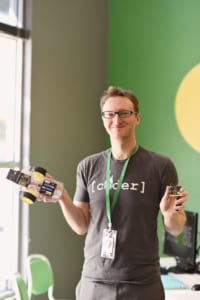
This article will discuss ways to give parents and students some good ideas of how to continue making progress even when they’re not in their coaching sessions as well as helping them to make their sessions more productive. We all know what goes on during a coding session when a student is working closely with their Code Coach® learning, asking questions, and building. We’re not going to discuss those things, but instead are going to focus on what students should be doing outside of their sessions. We do understand that today’s kids are inundated with so many after school activities that sometimes it’s very difficult to do much else other than attend their actual sessions. This is fine so we’re not condemning these kids for being super busy and active. However, if a student does have time we want to make sure they’re aware of things they can do before and after their sessions.We asked a bunch of our Code Coaches® for some of their best recommendations for their students and here’s a summarized list of the top ones.
Come Prepared

Spend time thinking about what you want to accomplish in your upcoming session. This way you won’t waste the first few minutes of your next session trying to figure out what you want to accomplish.
It will also keep your project work fresh in your mind so that you will have at the top of your mind allowing you to get right into your lesson. Don’t worry about there being a minimum amount of time you have to spend thinking about it. The more the merrier of course, but even 15 minutes prior to your lesson will help.
Pick a new project

When you’re close to completing a project and will be transitioning to a new one, spend time during the week online browsing other projects in the language that you’re working in. Look for some cool projects that would be engaging to you. This is generally a fun exercise anyway, but it will also save you quite a bit of time having to do this with your Code Coach®. There’s better ways to spend your time with your Code Coach® since you can browse projects on your own outside of your lesson.
Practice Syntax

Syntax is certainly something that you don’t need your Code Coach® to practice. There’s plenty of online sites that have exercises for you to improve your coding syntax. It’s more guided so you can focus on your syntax more and spend more time on your logic and design while with your Code Coach®. An exmple of one of these sites is Khan Academy (www.khanacademy.org).
set goals

Always set goals. This is actually just good advice in general. Without goals, it’s always easy to lose focus. This goes for life in general, but especially when learning to code. If you set a goal, you’re more focused and your tasks at hand become more clear. It keeps you on an upward and more narrow path towards your goal. Once you achieve your goal, rinse and repeat and set another goal to accomplish.

visualize and write things down
To help you in achieving your goals, one helpful tip is to visualize it and write them down. Visualization helps you get comfortable and gives you confidence that you can do it. The exercise of writing it down gives you more commitment towards achieving it. So use both of these to your advantage. Each are simple to do and doesn’t take much time at all and we promise they will help you reach your goals much faster.
Build fundamental skills and Project Prep
![]()
No matter how good you are, there’s always room to improve in your fundamentals. A great example is if you’re younger and not yet proficient at typing, work on your typing skills. There’s plenty of online typing sites which you can do for free. If improving your fundamentals is too boring for you, work on some of the extra-curricular items for your project such as the images and sprites. Browse for some fun images or use online editors to build your sprites.
Summary
In Summary, always try and use your time wisely. If you have some spare time in between your lessons there’s so many things that you can be doing to continue your progress and to allow for your Code Coach® to focus on more critical things during your lessons. And remember, even if it’s just 15 minutes of free time that you have, you can still use it to your advantage.
 Seattle, WA
Seattle, WA













